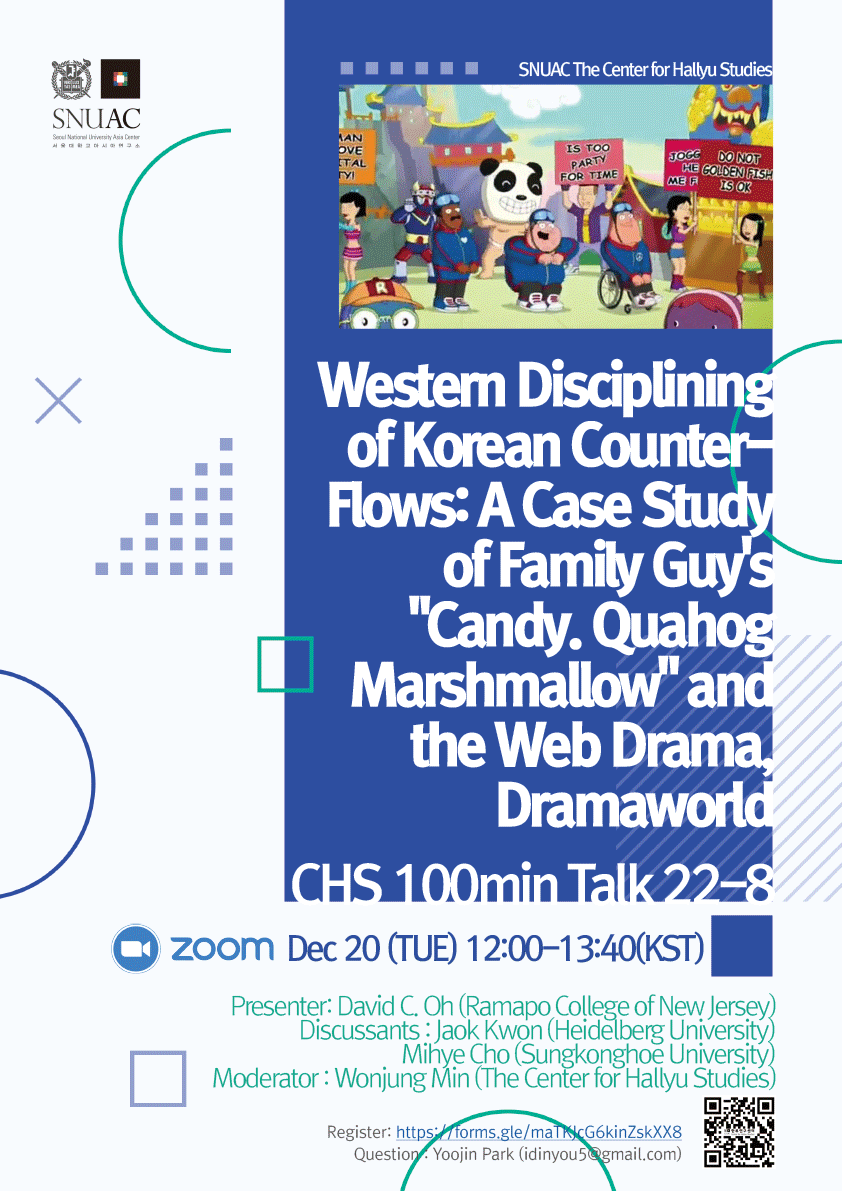Presenter
David C. Oh (Ramapo College of New Jersey)
Discussants
Jaok Kwon (Heidelberg University)
Mihye Cho (Sungkonghoe University)
Moderator
Wonjung Min (The Center for Hallyu Studies)
Western Disciplining of Korean Counter-Flows: A Case Study of Family Guy’s “Candy. Quahog Marshmallow” and the Web Drama, Dramaworld
한국 미디어의 초국가적 흐름과 미국에서의 수용은 매우 자명하다. 방탄소년단의 세계적인 인기, ‘기생충'(2020)의 예상을 뒤엎은 아카데미상 수상, ‘오징어 게임'(2021)의 성공 등을 거론하며 한국 언론에 대한 인지도와 비판적인 반응이 높아지고 있다는 기사가 쏟아지고 있다. 예를 들어 김주옥(2021)은 서구의 한국의 미디어 콘텐츠 수용이 주변부에서 주류로 옮겨간 트랜스네셔널한 현상을 ‘제3의 한류’라고 불렀다. 이는 한국 미디어의 움직임이 동서양의 성공적인 역류와 글로벌 미디어의 헤게모니 밖에 있다는 점에서 특별하다. 왜냐하면, 서구 미디어 정책, 미디어 기관 및 청중은 이러한 움직임을 규율할 것을 제안하는 매개된 역류에 대한 모든 이전의 연구에 반대하기 때문이다(Thusu, 2007). 확실히 서구 미디어, 특히 미국 미디어는 한국 미디어의 시장으로의 유통을 제한하면서 자기 방어적이었다. 따라서 이 강연의 목적은 서구에서 만들어진 두 가지 미디어 텍스트인 인기 만화와 웹 드라마 공동 제작이 어떻게 양면적으로 이러한 움직임을 규율하고, 재상상하고, 맞서고, 촉진하는지를 다루는 것이다. 한국이 영향력 있는 미디어 허브로 부상하고 있고 미디어스케이프가 전 지구적으로 점점 더 혼종화되는 시기에 서구가 비서구적 미디어스케이프를 양면적으로 매개하는 방식을 고려하는 것은 의미가 있다. 글로벌 디지털 플랫폼, 관객 취향, 기업 미디어 전략이 서구의 규율과 자기 방어를 극복하거나 회피하기에 충분한지는 시간이 말해주겠지만, 주목하고 있는 것은 분명하다.
The transnational flows of Korean media and its reception in the US has been highly celebrated. Citing BTS’s global popularity, Parasite’s (2020) unlikely Academy win, and the viral success of Squid Game (2021), there have been numerous articles about the rising awareness and critical reception to Korean media. Ju Oak Kim (2021), for instance, has referred to what she sees as a transformational stage in which Korean media have moved from the margins of Western reception to the mainstream, dubbing this “the Third Korean Wave.” This would mark Korean media movements as extraordinary for their successful counter-flows from East to West and for being outside the Anglophone hegemonic dominance of global media. If so, thiruns against all previous research on mediated counter-flows that suggest that Western media policy, media institutions, and audiences discipline such movements (Thussu, 2007). Certainly, Western media, particularly U.S. media, have been self-protective, restricting distribution into its market. The purpose of this talk, then, is to address how two media texts that are created in the West – a popular cartoon and a web drama co-production – ambivalently discipline, re-imagine, confront, and facilitate these movements. It is meaningful to consider the ways in which the West is mediating the ambivalent inclusion of a non-Western mediascape during a time in which Korea is emerging as an influential media hub and in which mediascapes are increasingly a global pastiche. Time will tell if global digital platforms, audience tastes, and corporate media strategies are sufficient to overcome or sidestep Western disciplining and self-protection, but it is clear that it is taking notice.


